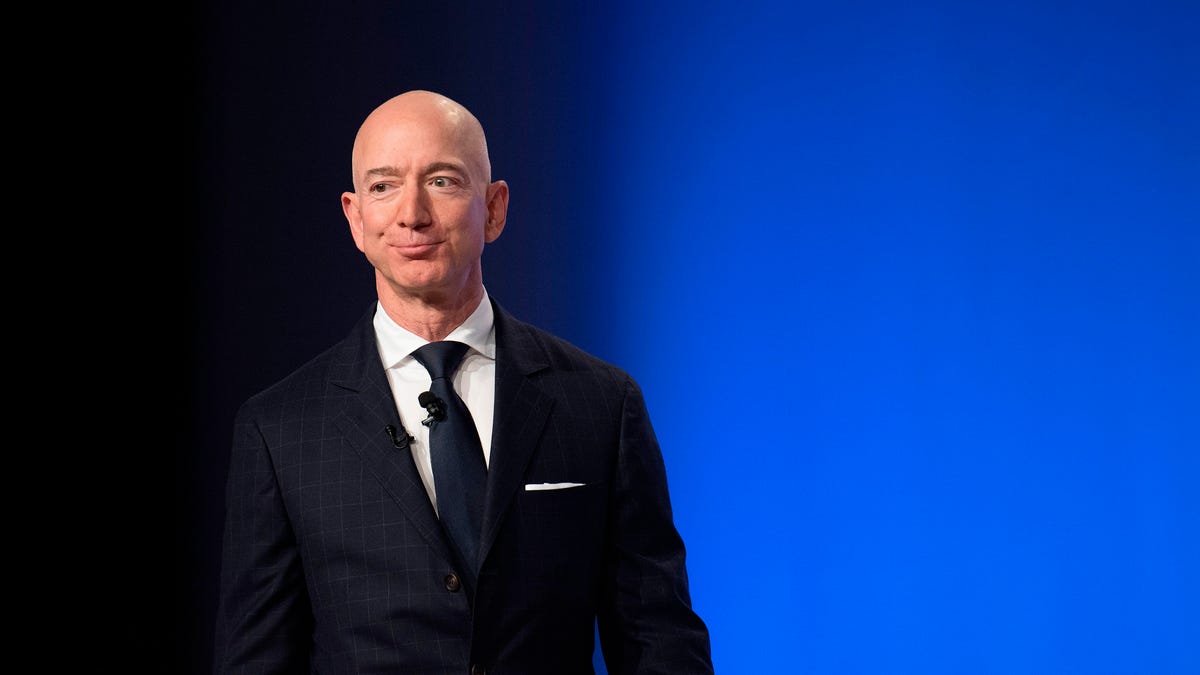Shareholder efforts to curb Amazon facial recognition tech fall short
The proposals were both long shots to pass, but added pressure on Amazon on its sale of Rekognition.

Amazon CEO Jeff Bezos
Two Amazon shareholder proposals about the company's controversial facial recognition technology failed to pass Wednesday, following a concerted push by civil rights groups and activist investors.
One proposal would have banned Amazon from selling its Rekognition technology to government agencies unless it first determines the software doesn't infringe on civil liberties. The other proposal called for an independent study of the potential privacy and human rights violations caused by Rekognition.
Both proposals were presented at Amazon's annual shareholder meeting in Seattle on Wednesday. The company said it isn't disclosing the vote tallies until this Friday.
"The fact that there needed to be a vote on this is an embarrassment for Amazon's leadership team. It demonstrates shareholders do not have confidence that company executives are properly understanding or addressing the civil and human rights impacts of its role in facilitating pervasive government surveillance," Shankar Narayan, the American Civil Liberties Union of Washington's Technology and Liberty Project director, said in a statement. "While we have yet to see the exact breakdown of the vote, this shareholder intervention should serve as a wake-up call for the company to reckon with the real harms of face surveillance and to change course."
Both proposals, which were non-binding, were long shots to pass, since Amazon's board said it was against the proposals. Major shareholders typically follow such positions to show support for the board. Also, CEO Jeff Bezos, Amazon's board chairman, is the company's biggest shareholder, controlling about 16% of its stock, and wasn't expected to vote for either proposal.
Amazon said it was against the proposals because the technology has proven its value in improving public safety, adding to its view that Rekognition provides "material benefits to both society and organizations" using the software.
The decision quickly reached Capital Hill, where lawmakers were holding a hearing looking at facial recognition's effects on civil liberties.
"I just got word that the shareholders did not end up passing a ban on the sale of Rekognition," Rep. Jimmy Gomez, a Democrat from California, said at the hearing. "That just means that it's more important that Congress acts."
Despite the failure of the shareholder votes, the groups pushing for changes to Rekognition's use succeeded in raising awareness about the technology and keeping pressure on Amazon. Organizations like the ACLU have spoken out against face identification's use, saying it could quickly turn the US into a surveillance state and infringe on people's privacy.
Following the shareholder vote Wednesday, it seems likely activists will continue pushing against Rekognition's use but find other public venues to do so.
Both Google and Microsoft have publicly said they won't sell their facial recognition tech to law enforcement, instead asking for new laws to guide their use. In less controversial settings, facial recognition tech is also used to unlock Apple iPhones using the Face ID feature and to check travelers' identities at government kiosks at US airports.
"It's not just our test, it's other tests that have noted similar problems with Amazon's software and other face recognition algorithms," the ACLU's senior legislative counsel Neema Singh Guliani told Congress members at a hearing on Wednesday.
We're at @Amazon's shareholder meeting today urging shareholders to take action in response to the company's failure to address the civil rights impacts of its face surveillance technology.
— ACLU (@ACLU) May 22, 2019
Ironically, Amazon won't allow cameras into the meeting, so we've filmed a short preview: pic.twitter.com/tNN4pkK4tG
Amazon, meanwhile, sells Rekognition to policing agencies, with one sheriff's office in Oregon already using the software to investigate crimes and make arrests.
The company has also joined the call for more legislation and guidelines on facial recognition tech, but made no indication it would stop selling Rekognition to policing agencies.
"New technology should not be banned or condemned because of its potential misuse," Michael Punke, Amazon Web Services' vice president of global public policy, said in a blog post in February. "Instead, there should be open, honest and earnest dialogue among all parties involved to ensure that the technology is applied appropriately and is continuously enhanced."
That position has brought a growing wave of criticism against Amazon, with civil liberties groups, members of Congress and its own employees calling on the e-commerce and cloud-computing giant to curb its sale of Rekognition to police.
Open MIC, which helped organize the vote, said in a statement that this issue would not be going away.
"Amazon's refusal to acknowledge and confront the potential harms of Rekognition is ongoing evidence of corporate arrogance," Michael Connor, Open MIC's executive director, said in an email. "Investors have a right to know how Amazon intends to address these material risks to the company and its reputation. As one of the leading technology companies in the world, Amazon can and must do better."
Concerns about Rekognition also came up during public hearings before the New York City Council on Amazon's failed proposal to build a new campus in the city, with council members repeatedly chastising the company for marketing Rekognition to US Immigration and Customs Enforcement.
Amazon on Wednesday said all other shareholder proposals also didn't pass. Those included a call to study Amazon's impact on climate change, a request for a report on how Amazon addresses hate speech and offensive products on its platform, and a proposal to elect an independent chairman so Bezos wasn't both CEO and the head of the board.
Originally published at 9:52 a.m. PT.
Updated at 9:57 a.m. PT: Adds remarks from the ACLU. At 10:33 a.m. PT: To add responses from Open MIC.



